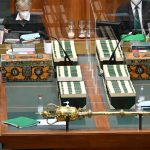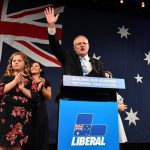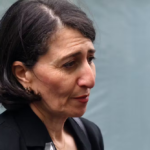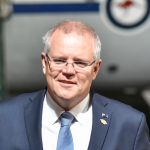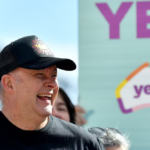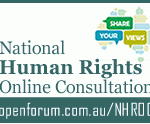The heartbreak behind Australia’s first gay marriage

Queensland’s Attorney-General and Minister for Justice Yvette D’Ath has revealed that Australia’s first same-sex marriage was held in Queensland, in December 2017.
The marriage – between two Queensland women – was held on December 15 and allowed to proceed without the 30-day waiting period because one of the women was terminally ill with a rare cancer.
Jo’s family has since asked for their story to be made public.
“I know there are other couples that were married that weekend, and for different reasons. They are among the first … and the reason we did is a tremendously sad one, and I’d trade everything for not having to stand here and talk about this story,” Ms Kindt said.
In 2013, Ms Kindt and Ms Grant held a commitment ceremony, or a “promise day” as they called it, and considered themselves to be each others’ spouses ever since. Their 2017 wedding made their marriage legal.
“It was great, it was really good. It was legal … Jo very much wanted it to happen, as I did,” Ms Kindt said. “It’s very hard to describe. We considered ourselves married, but in a legal sense we weren’t.”
Ms Kindt said she and her wife were humbled by those behind the scenes who moved heaven and earth to make sure they had as much time possible together legally married.
“But we were overwhelmed by the fact the people who did not know us made something that we wanted happened and gave us a whole heap of joy. That’s the story,” Ms Kindt said.
“But I’m glad the story’s been told for Jo, and I loved hearing her name being said in Parliament today. Jo and I got to be legally married for 48 days. I’ll take that.”
“This is a love story – of the deep bond between Jo Grant and Jill Kindt,” Mrs D’Ath told Parliament.
“This is also an inspiring story – of the extraordinary lengths our staff went to, to make this historic marriage happen before it was too late.
“And it’s a story of hope that reframes Queensland as a modern, trailblazing state which recognises equal rights and the most fundamental principle – that love is love.”
Mrs D’Ath told Parliament today that Jo and Jill were approved, married, and registered all in one day, after the Registrar ruled exceptional circumstances and staff at Births, Death and Marriages went the extra mile.
“The marriage ceremony took place in the couple’s Sunshine Coast garden, as their family and friends watched on, a community of strangers pulling together to make this marriage happen in time.
“Then the extraordinary staff at Births, Deaths and Marriages went one step further – to deliver the marriage certificates immediately, a team member met the celebrant half way between Brisbane and the northern beaches, pulling over at a roadside servo to deliver the precious paperwork.”
Jo died on January 30 2018. Her wife and parents were in Parliament for today’s statement.
Jo and Jill were one of 159 same sex couples who have been married in Queensland since the marriage equality laws were passed. Another 70 have been booked in with the Registry of Births, Deaths and Marriages before the end of the year.
The Palaszczuk Government has now released a discussion paper exploring how improvements could be made to the legal recognition of Queensland LGBTI people and their families.
Mrs D’Ath said the release of the discussion paper was a key step into a refreshed review of the state’s Births, Deaths and Marriages Registration (BDRM) legislation.
“The Palaszczuk Government acknowledges that there are many people in the lesbian, gay, bisexual, transgender and intersex community who feel that the current legislation does not adequately reflect or capture the true fabric of all Queensland families,” Mrs D’Ath said.
“Now that we have marriage equality, the time is right to examine whether Queensland’s life event registration services meet changing community expectations and the needs of LGBTI Queenslanders.”
Mrs D’Ath said the discussion paper – ‘Registering life events: Recognising sex and gender diversity and same-sex families’ – examines three main issues:
- collecting and registering a person’s sex;
- recording the reassignment of a person’s sex; and
- recording same-sex families on the register.
Mrs D’Ath said the paper also examined whether the processes and criteria for legal recognition were easily accessible and user-friendly and saw it as an important step in working towards ensuring all people’s sex and gender is respected and formally recognised in the state.
She also introduced amendments to the Births, Deaths and Marriages Registrations Act 2003 to ensure a person who undertakes gender reassignment doesn’t have to divorce their current spouse. Section 22 of Act has previously meant that any Queenslander who has undergone sexual reassignment surgery had to divorce their partner to have their gender legally recognised.
The Minister argued this has caused significant anguish for many gender diverse Queenslanders and should change to avoid the distressing decision of choosing between their marriage and the legal recognition of their gender identity.
She revealed that other amendments may also need to be made to Queensland legislation as a result of marriage equality and the Government is considering these changes alongside the review of BDMR legislation.
Further information on the BDMR Act review has been made available and Queenslanders can have their say on the proposals here.

Open Forum is a policy discussion website examining the social, political, economic, cultural and environmental issues of today. We welcome contributions and invite you to follow us on Twitter, Linkedin, Federated Press and Vivaldi Social. We #StandwithUkraine.







